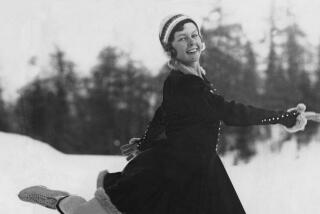Tessa Virtue, Scott Moir of Canada win gold in ice dancing
- Share via
Reporting from Vancouver, Canada — Could you imagine Joe Torre managing the Dodgers and Angels?
Or Canada’s hockey coach, Mike Babcock, behind the bench for both the Canadian and U.S. teams?
That’s the situation in the ice dance, where the top two finishers, one from Canada and one from the United States, share a pair of Russian émigré coaches and the same training rink in Canton, Mich.
Such arrangements are not unusual in figure skating, where one coach often trains rivals in the same discipline.
But Monday’s ice dance final made history: the first gold and silver skating medalists from different countries who had trained together with the same coach.
Igor Shpilband and Marina Zoueva coach Tessa Virtue and Scott Moir of Canada, deservedly easy winners after the free dance, and Meryl Davis-Charlie White of the U.S., who were 5.83 points behind.
Virtue and Moir are the first non-European team to win since ice dance joined the Olympic program in 1976.
The judges wouldn’t allow Russia to be kept from a dance podium for the first time, allowing a desultory performance by reigning world champions Oksana Domnina and Maxim Shabalin to get the bronze.
Said Shabalin at the press conference afterward: “I think we have to take all the Russian coaches back.”
Tanith Belbin and Ben Agosto of the U.S., Olympic silver medalists in 2006, were fourth.
“We skated as well as we could,” White said. “The other teams will have to step up to match it.”
Virtue, 20, and Moir, 22, did with an exquisite interpretation of the adagietto from Mahler’s Fifth Symphony, subtly underscoring the emotional power of the music and still managing eye-catching lifts and pirouettes and a striking final position worthy of ballet.
They let go on the awards stand at the Pacific Coliseum, belting out “O Canada” as the gold medals hung from their necks.
Their victory -- and the silver for Davis, 23 and White, 22 -- may have represented a turning point for ice dance, where results once seemed to be mailed in years ahead.
The Canadians, winners of world medals the last two years, moved up to the Olympic title from sixth at the 2007 world championships to the Olympic title despite being sidelined much of last season after Virtue had shin surgery.
“It wasn’t right away we thought we’d come to Vancouver and compete at the Olympic Games, let alone win a medal,” said Virtue, youngest Olympic dance champion ever.
Davis and White were seventh at the 2007 worlds and have yet to win a world medal.
The Canadians, natives of London, Ontario, have been skating together for 13 years but began working with Shpilband and Zoueva five years ago.
Davis and White, both from suburban Detroit, also have been together 13 years, all with the same coaches.
Zoueva said there were no problems in dealing with the rival teams.
“It is actually very nice,” she said. “They are so different in their characters, their physical and artistic abilities.”
The Canadians had flamenco for their original dance, which had to be a folk dance. Davis and White used Indian music.
Davis and White did an athletically creative free skate to standard fare, music from “Phantom of the Opera.”
Virtue and Moir reached for something much more musically complex in the hauntingly beautiful Mahler, a recurring theme in the movie, “Death in Venice.”
The music has been interpreted over the years as both elegiac and a statement of love, and Zoueva’s choreography was based on the latter idea.
More to Read
Go beyond the scoreboard
Get the latest on L.A.'s teams in the daily Sports Report newsletter.
You may occasionally receive promotional content from the Los Angeles Times.







